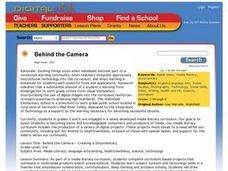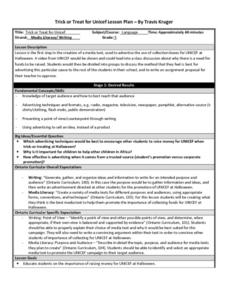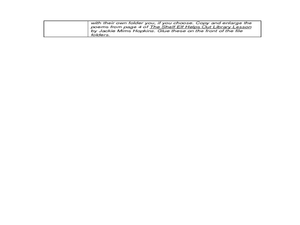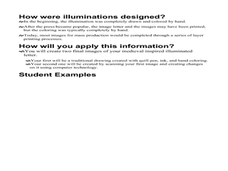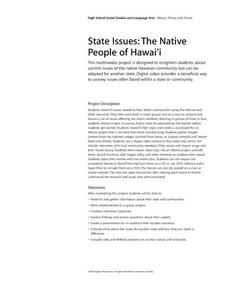Curated Video
Policy - The Community Guidelines
Following a site's community guidelines is just one step toward being an excellent digital citizen. After a brief introductory video, small groups come up with their own community guidelines and present their ideas to come up with a...
Curated Video
Detecting Lies & Harmful Links
Who and what can you trust online? How do you know? After viewing a pair of introductory videos on positive and safe online conduct, learners discuss the content and put it into practice during an online search activity about alien...
Curated Video
Online Reputation and Cyber-bullying
Combat cyberbullying with information. During this plan, learners watch a couple of videos, consider online behavior scenarios, brainstorm long- and short-term consequences, and discuss how to react to bullying in order to build up to...
Curated Video
Reporting - Safety and Abuse Tool
Keep your charges safe online with instruction on how to report problems on YouTube. After providing learners with information on the Safety and Abuse Tool, demonstrate how to use the tool and discuss the feature. In groups, learners...
Curated Video
Reporting - Flagging
While it may feel like you can post just about anything on YouTube, that's not the case. Teach your class about flagging inappropriate content. Learners watch a demonstration, practice flagging, and answer questions about online content.
Curated OER
Behind the Camera
Scholars, in groups, gather information relating to community health care. Using video and digital cameras, they interview members of a health center staff. They then compile digital images, select music, and narrate a story about their...
Curated OER
Trick or Treat for Unicef
Creative thinkers develope advertisements. They work in groups to create an advertisement featuring the importance of contributing to UNICEF. They research, learn about point of view, and present final projects to the class.
Curated OER
General Lesson Plan for Documentary Lens
Use this general lesson guide to inform your instruction surrounding a documentary. The lesson is made up of five activities. The activities are intentionally general because they are designed to adapted for specific films. While the...
Curated OER
All About Me
Kids almost always want to share the things that make them special. They create and deliver an autobiographical multimedia presentation using step-by-step outlines to plan their content. This is a great "All About Me" lesson, perfect for...
Curated OER
Sorting
Students examine the concept of organization. In this library skills lesson plan, students practice ordering and sorting skills by playing the Flood Game.
Curated OER
How Do I Write an Article Critique?
Your middle and high schoolers have written tons of summaries, but can they give a strong critique of an article they've read? Identify the differences between summary writing and critiquing. Choose an interesting article and have...
Curated OER
Now That's News To Me!
Students observe how newspapers help to build a sense of community. They identify the important events and people within their school community and create a newspaper page/section. They choose photographs or clippings to use on their...
Curated OER
A House is a House for Me: Library Skills for Young Readers
Read Mary Ann Hoberman's book A House is a House for Me to introduce the idea that a library is a house for shelves of books. Young readers practice alphabetizing in the picture book (easy fiction) section of the library. They learn how...
Curated OER
Library Skills: Biography
Biographies deserve special attention when training youngsters how to use the library because they are alphabetized by subject rather than by author. Guide children through the process of finding biographies over a two-visit series. On...
Curated OER
Book Jacket Match: Practice with the Dewey Decimal Classification System
As a follow-up activity to being introduced to the Dewey Decimal Classification System, 3rd graders listen to poems from Jackie Mims Hopkins' book The Shelf Elf Helps Out and sort book jackets by category and call number.
Curated OER
Life Choices
By examining two differing perspectives on the topic of abortion, upper graders will be able to build an opinion of their own. A teacher-led lecture outlines key points in the debate for or against abortion including, the role of...
Curated OER
Designing Illuminated Text
High schoolers examine illuminated manuscripts from the Gutenberg Bible. Using the examples, they use the internet to explore the effects of the printing press on the value of literature and art. They create their own illuminated initial...
Curated OER
Obesity
Class members participate in a discussion, read a newspaper article, and participate in activities meant to open their eyes to the problem of obesity in the US. There are resource links, electronic worksheets, and teacher's notes to help...
Curated OER
The Mystique of the Artist
Your high schoolers explore the role of artists in society in a creative three-week unit. First they customize art supply bags using paint, embroidery, appliqué, and other media. They imagine their ideal artistic work space and...
Curated OER
Plotting A Hurricane Using latitude and Longitude
High schoolers explore map and plotting skills by tracing the movement s of hurricanes through the Earth's systems. a hurricane map is developed from daily media reports.
Curated OER
State Issues: The Native People of Hawaii
Students research issues about their state and community. They work in groups to create a multi-media presentation highlighting the issues.
Curated OER
To Rot or Not!
Students discover that composting helps reduce landfill waste and is good for the soil. They explore the techniques of composting through a variety of media, art activities and hands-on experience.
Curated OER
Puzzle Trees
Elementary artists use a collage and multi-media technique to create textured trees. They study the fall trees, discussing texture and what bare trees look like. They then use a variety of materials to create a textural piece.
Curated OER
Sea Changes: A New England Industry
Students conduct research in order to use primary and secondary sources. They interpret and analyze information from textbooks and nonfiction books for young adults, as well as reference materials, audio and media presentations, oral...







